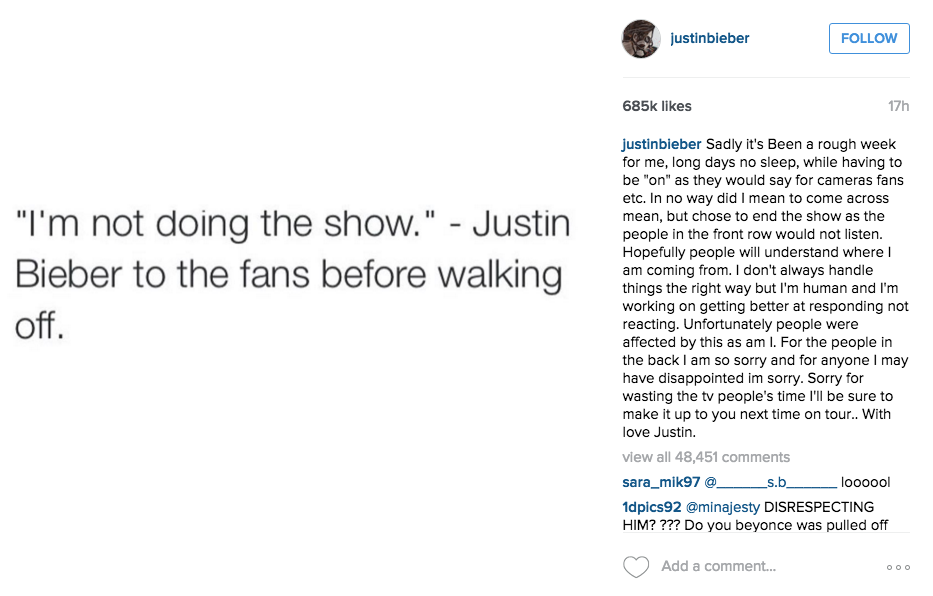What Justin Bieber Can Teach Us About Anger Management

There are impulse-control lessons to be learned from the singer’s dramatic reaction at a concert on Thursday evening — and his response to it. (Photo: Instagram)
Justin Bieber has publicly apologized after storming off a stage in Oslo Thursday during a TV performance.
Bieber became angry after one of his fans spilled something on the stage and he was blocked from trying to mop it up, TMZ reports.
“Yo, listen to me. Are you listening to me? OK, I’m trying to wipe the floor, give me a second, yo,” the 21-year-old said, followed by, “Guys, never mind, I’m done. I’m not doing the show.”
Hours later, Bieber posted a message on Instagram, apologizing to fans for his behavior. “Sadly it’s been a rough week for me, long days no sleep, while having to be ‘on’ as they would say for cameras, fans, etc.,” he wrote. “In no way did I mean to come across mean, but chose to end the show as the people in the front row would not listen.”

(Image: Justin Bieber | Instagram)
He also said he’s working to be more level-headed: "Hopefully people will understand where I am coming from. I don’t always handle things the right way, but I’m human and I’m working on getting better at responding not reacting.”
This isn’t the first time this week that emotions have gotten the better of Bieber: He also walked out of an interview on Wednesday with a Spanish radio station.
But experts say his recent comment about “responding, not reacting” is an important one.
“That’s a phrase that psychologists use,” Miami-based licensed clinical psychologist Erika Martinez, PsyD, tells Yahoo Health. “It’s out of mindfulness literature.”
Related: 4 Ways to Let Go of Anger
Mindfulness is the effort to be more aware of the present moment while calmly acknowledging your feelings and thoughts, she explains.
The words “respond” and “react” are very similar but have very different meanings when it comes to describing behavior, licensed clinical psychologist Alicia H. Clark, PsyD, tells Yahoo Health.
“A ‘reaction’ is largely emotional and protective in nature, whereas a ‘response’ includes thought and is more intentional,” she says. “Higher cortical brain areas are engaged when we think about a response rather than impulsively react, and this allows us to behave in the world in a way that is more consistent with our values and intentions.”
It’s easy to spot a reaction vs. a response, psychologist Paul Coleman, PsyD, tells Yahoo Health. “A reactive comment or action usually creates or intensifies conflict,” he says, adding that a reactive reply usually sends the message “you are wrong.” A responsive comment, on the other hand, reduces conflict and sends the message of “I want to understand.”
“Reactors are more likely to blame, to say ‘You made me do it!’” he says. “Responders are more likely to take ownership of their actions.”
It’s possible to go from being a reactor to a responder, Clark says, but it takes practice in situations that are upsetting. Often, the difference between the two is taking a few seconds to process the situation and think of a proper response before speaking or acting.
While Bieber’s situation is unique, experts say his mantra is one we can all benefit from. “Everybody has been in arguments where things get out of control, feelings get hurt, and nothing gets solved,” Martinez says. “If we’re more mindful of how we respond, and not just impulsively react, we can certainly be better employees, bosses, spouses, parents, and people.”
Read This Next: The Scary Thing Anger Does To Your Heart

